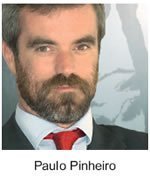CMT Update: How Portugal is turning the tide – Vieira de Almeida
It seems the current economic crisis hasn’™t affected Communications Media and Technology (CMT) investments in Portugal, where the sector is booming and where, contrary to what the current economic scenario would suggest, legal counselling in the TMT sector has suffered no reduction in demand.
Actually, further to the growth of investment in fibreoptic and nextgeneration networks (NGNs) it seems investment in information systems has increased, as a way of effectively reducing business costs.
Proof of this bustling market is seen in the many newly incorporated small and medium companies in the technology area. Also, the need to cut down on costs has turned companies to outsourcers in all CMT areas, which has allowed for new kinds of business models, as well as new legal issues arising therefrom – such as the base-location for the services and the exercise of regulated activities by third parties.
The Government has also contributed to the maturing of the Portuguese technological setting, notably through the Technological Plan (approved by the Council of Ministers Resolution 190/2005, dated 16th December), the Government’s action agenda for reinforcing the competitiveness of Portuguese companies, families and activities – particular attention being paid to CMT.
Another relevant contribution was the global incentive to NGNs. Specifically, the Government has issued legislation to facilitate access to the necessary infrastructures (DL 123/2009), has mobilised the National Regulatory Authority – ICP-ANACOM – to issue a regulatory framework enabling stable investment; and has assumed a commitment with the operators towards the implementation of these networks. Also in this context, five public tenders have been launched for the implementation of NGNs in remote areas of Portugal.
Such investments in NGNs and in broadband already in place (those on course or expected) have contributed to the development of a blossoming national digital content sector, stimulating the growth of content providers.
In the media sector, the launch of the public tender for the creation of a fourth national TV channel with free unrestricted access is worth mentioning, despite its uncertain outcome – the relevant Regulatory Authority excluded both applications made, and who have now appealed to the Portuguese Courts.
Also worthy of note, are the launch of public tenders for digital terrestrial television (DDT), one for pay-tv and another for free-to-air. Both licences have been awarded to a major group after a judicial appeal was presented by another bidder.
Electronic commerce is also a growing area in Portugal (partly due to governmental initiatives towards a paperless Public Administration). As consumers and market players gain confidence in this mechanism, companies have chosen e-commerce as a preferential means for interacting with their customers, with the corresponding increase in legal advice in the area.
Alongside these specific projects, a new investment tax code has also been approved, granting market players in the CMT area several benefits and market opportunities, in an effort to consolidate investments in the sectors. Furthermore, legal counselling on CMT has been branching out of Portugal, based on collaborations established with African Portuguese-speaking countries, like Angola, Mozambique and Cape Verde.
All of the above has resulted in a very dynamic CMT market in Portugal, a trend likely to continue as relevant projects are expected for 2010 and 2011:
(i) the full launch of the DDT with the switch off of analogue television;
(ii) the analysis of relevant markets (following publication of the European Commission Recommendation on this matter);
(iii) the full liberalisation of Postal services (to take place in December 2010),
(iv) the public tender for assignment of the Universal Service Provider in the electronic communication sector;
(v) the issues related to digital dividend and mobile television;
(vi) consolidation of next generations networks, and
(vii) possible launch of a new public tender for award of the license of the fourth television operator, depending on the outcome of the pending court decision.
All these projects stem from one goal: bringing Portugal to the forefront of the global CMT scenario. Whether this is achieved or not will require an analysis in the long run. Meanwhile, one thing is certain: these are exciting times for CMT professionals in Portugal.











